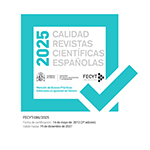Paper institutions: the early modern state and the role of women in the credit market through pious works
Abstract
The aim of this article is to understand how women from the early modern period participated in credit markets through paper institutions and which were the consequences for the state consolidation. To achieve that objective, this work analyses the development of a pious work created after the death of a businesswoman, which contributed to the mobilisation of capital and the interconnection of local and regional economies through conventual and marriage dowries during the sixteenth and seventeenth centuries in Castile.
Downloads
Article download
License
In order to support the global exchange of knowledge, the journal Cuadernos de Historia Moderna is allowing unrestricted access to its content as from its publication in this electronic edition, and as such it is an open-access journal. The originals published in this journal are the property of the Complutense University of Madrid and any reproduction thereof in full or in part must cite the source. All content is distributed under a Creative Commons Attribution 4.0 use and distribution licence (CC BY 4.0). This circumstance must be expressly stated in these terms where necessary. You can view the summary and the complete legal text of the licence.












